Read More

Discover what’s next for AI in healthcare in 2026 - Get Access to the Full Report
How AI is Revolutionizing Software Development to Reshape the Real Estate Industry

Vivek Chavda
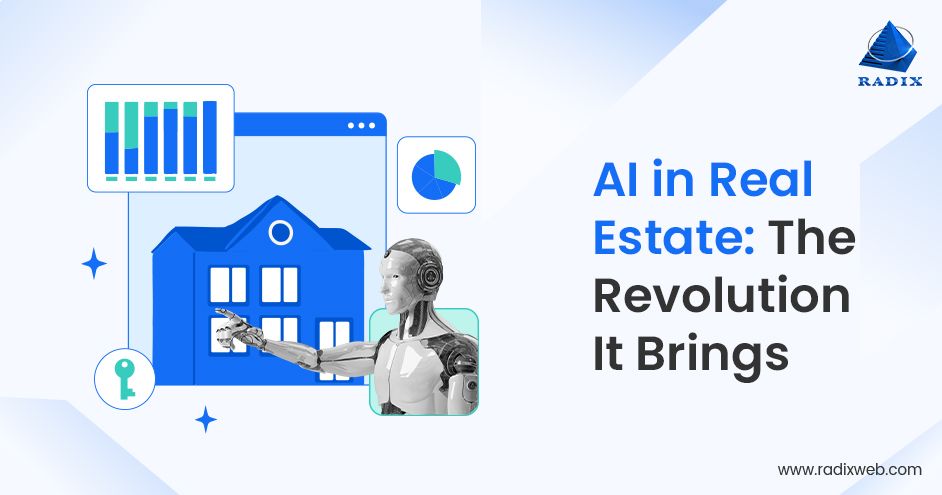
On This Page
- Significance of AI in Real Estate
- The Shift from Legacy Systems to Intelligent Real Estate Software
- AI Technologies Driving Real Estate Development
- Why Invest in AI for Real Estate?
- What are the Benefits of AI in Real Estate?
- Challenges of Using AI in Real Estate Development
- Real-Time AI Applications in Real Estate Industry
- How to Use AI in Real Estate?
- The Future of AI in Real Estate
- Take the Next Step with Radixweb!
Quick Sum Up: As PropTech experts, we at Radixweb have closely monitored and architected the AI shift revolutionizing the real estate industry. From enhancing property valuation accuracy and deploying intelligent chatbots to enabling immersive virtual tours and automating complex document workflows, AI transforms how properties are bought, sold, leased, and managed. While certain hurdles still prevail, Radixweb believes that integrating AI in real estate software development is becoming imperative for outshining in today’s ever-changing, fast-paced property market. Read on to know more!
The real estate industry is evolving drastically, driven by the rising demand for rapid, scalable, and more intelligent solutions. Once dependent on manual processes and legacy systems, the industry is now actively opting for AI-powered real estate software to help with data-driven decision-making, delivering personalized user experiences, and automating operations.
As front-runners in PropTech innovation, we at Radixweb have witnessed and engineered this transformation firsthand. We've collaborated with real estate firms to create AI-powered platforms that help boost client engagement, automate property evaluation, and streamline lead management. Our close collaboration with real estate innovators gave us a front-row seat to the opportunities and challenges of this shift.
The transformation isn’t theoretical - it’s measurable. With the AI in the real estate market projected to reach USD 988.59 billion by 2029, tech leaders, real estate firms, and developers must reevaluate how platforms should be designed and delivered.
From our decades of experience in software development, we have curated this blog to help you explore:
- The shift of software development in real estate
- The most efficient AI use cases in real estate
- Key benefits for developers and users
- Implementation challenges (and how to solve them)
- A roadmap to integrate AI into your PropTech stack
So, whether you're starting from scratch or scaling an existing platform, understanding the importance of AI in real estate is imperative for future-proof development.
On This Page
- Significance of AI in Real Estate
- The Shift from Legacy Systems to Intelligent Real Estate Software
- AI Technologies Driving Real Estate Development
- Why Invest in AI for Real Estate?
- What are the Benefits of AI in Real Estate?
- Challenges of Using AI in Real Estate Development
- Real-Time AI Applications in Real Estate Industry
- How to Use AI in Real Estate?
- The Future of AI in Real Estate
- Take the Next Step with Radixweb!
AI in Real Estate: Why It Matters Today
Traditionally, real estate is a slow-to-progress, data-heavy, and often complicated industry vertical. Whether it’s asset management, lead generation, or property valuation, many tasks depend on manual work, fragmented data, or outdated workflows.
Artificial intelligence is proving to be a real game-changer here. Wondering how? The AI solutions we developed help predict real estate tech trends, examine massive datasets, and automate manual and redundant tasks, which further help businesses and clients make more intelligent, data-based decisions faster. But why is this shift happening now? Because of:
- Operational Efficiency Demands – Working with different real estate clients, we noticed businesses are looking for faster transactions, minimal errors, and cost-efficiency.
- Client Expectations – Whether buyers or renters, they now demand virtual property tours, immediate responses, and personalized experiences.
- Data Explosion – A lot of data is accumulated in the real estate industry, from transaction histories to client preferences and market statistics to property listings.
- Technological Stability - We’ve worked with different AI algorithms; however, computer vision and machine learning are gaining immense prominence due to their accessibility and precision.
The Shift from Legacy Systems to Intelligent Real Estate Software
Across the last decade, real estate organizations have shifted from siloed, obsolete systems to advanced, scalable platforms integrated with cutting-edge technologies. The modern software solutions are custom-built to manage everything from digital contract management and predictive analytics to virtual tours and property management.
Radixweb, with its proven track record in custom software development for real estate, has experienced and engineered this shift firsthand, integrating technologies like AI. We have partnered with property firms all around the world to reinvent how advanced technologies fuel buying, selling, leasing, and managing assets.
AI’s Role in Redefining Real Estate Software Development
Today, AI is pioneering a new approach for real estate development by enabling:
- Process automation in documentation, underwriting, and workflow management
- Personalized property recommendations using behavioral data
- Computer vision for automated property assessment from images or video
- AI chatbots for instant client engagement and lead generation
- Property value prediction with the help of historical and real-time market data
As early adopters of AI, we observed that it not only streamlines operations but also provides a competitive edge through faster decision-making and intelligent insights.
Core AI Technologies Driving Real Estate Innovation
Following are the key AI technologies our developers have worked with to power real estate software solutions and the role they play in redefining the industry:
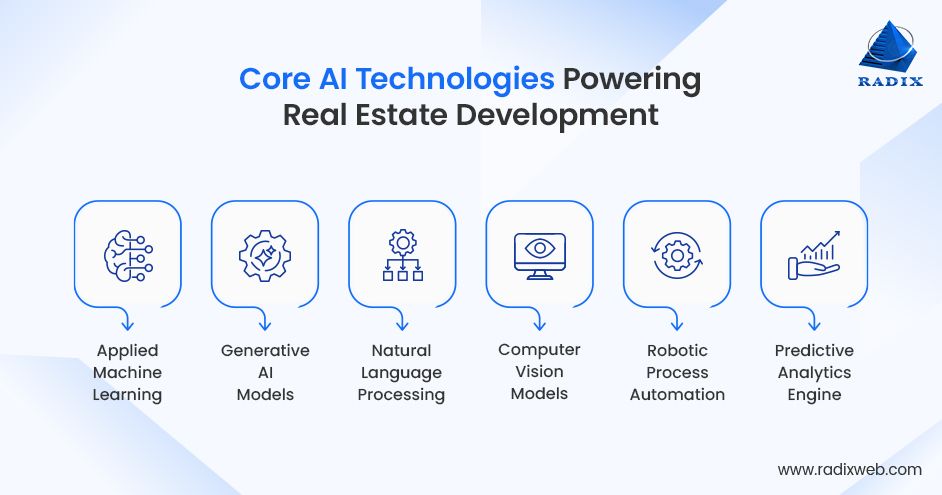
- Machine Learning (ML) - We used ML algorithms to examine historical and real-time data to forecast client preferences, property values, and market trends, which helps with sales strategies and smarter investments.
- Generative AI - Generative AI models help produce creative content like marketing equipment, floor plans, or virtual interiors to simplify property promotion and visualization.
- Natural Language Processing (NLP) - This technology helps automate and simplify communication through document processing, virtual assistants, and chatbots, which reduces workload and improves user interactions.
- Computer Vision- It helps with automated staging, image recognition for property inspection, and powers virtual tours, which improves decision-making and visualization.
- Robotic Process Automation (RPA) - It helps automate redundant administrative tasks such as transaction management, compliance checks, and contract generation.
- Predictive Analytics – This data analytics model helps predict buyer behavior, price fluctuations, and property maintenance needs, which minimizes operations expense and risks.
How do These Technologies Help Address Real Estate Challenges?
Since AI began gaining popularity in the real estate sector, we've observed many businesses experiencing value-driven benefits through it in areas such as:
- Process Automation - From document verification to lead qualification, our AI-powered real estate applications help simplify workflows to minimize errors and enable experts to emphasize high-value tasks.
- Cost Reduction - Automating routine and manual tasks reduces labor costs and speeds up turnaround times.
- Enhanced Property Search - The AI-based recommendation engines we integrated help deliver curated property listings considering market data and buyer preferences which further boosts client experience.
Why Invest in AI for Real Estate?
Let’s examine how using AI in real estate made a significant difference for our clients, combining advantages with some practical use cases:
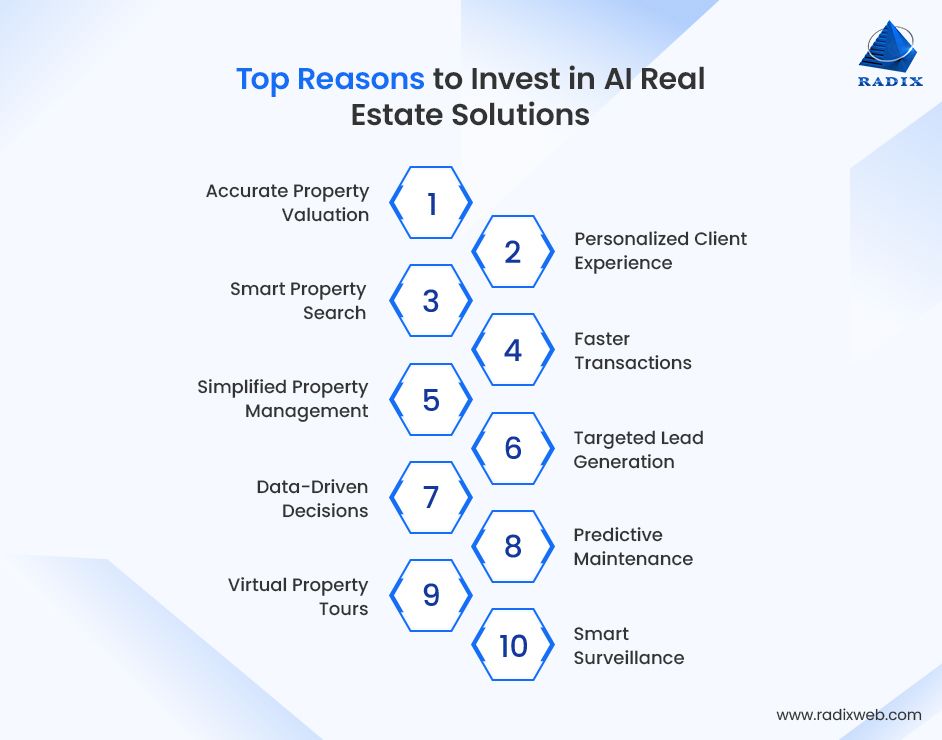
1. Accurate Property Valuation Improves Market Confidence
AI-driven automated valuation models help examine multiple aspects like property features, market trends, or location to deliver accurate estimates. For instance, Zillow’s Zestimate uses ML algorithms to offer real-time property valuations that help sellers and buyers make sound decisions.
2. Personalized Client Experiences Build Trust
Virtual assistants and chatbots powered by NLP come with tailored communication and 24/7 support, as reflected in REX Real Estate’s client interaction systems.
3. Smarter Property Search and Personalized Recommendations
AI algorithms assess users’ browsing patterns and preferences to recommend properties that best fit individual requirements. For example, Redfin’s AI-powered search engine redesigns listing photos, which minimizes time spent browsing off-topic options.
4. Faster Transactions with AI-Powered Document Automation
Automatic contract generation and verification reduce deal cycles, which minimizes manual errors and amplifies closing speed.
5. Simplified Property Management Saves Time and Costs
AI models automate tenant screening, maintenance scheduling, and rent collection. For example, Buildium’s AI-powered features streamline property manager tasks, helping you focus on optimizing tenant satisfaction.
6. Efficient Lead Generation and Targeted Marketing
AI helps recognize high-potential buyers and renters through behavioral data assessment, allowing agents to direct resources strategically. For example, Compass Real Estate integrates AI to improve marketing campaigns, which boosts conversion rates.
7. Data-Driven Decisions Increase ROI and Decrease Risk
AI-powered data analytics in real estate help with clear insights into investment potential and market trends to help organizations make smarter divestments and acquisitions.
8. Predictive Maintenance Lowers Operating Costs
AI models and sensors can seamlessly predict when equipment needs servicing before it fails, helping you save on expensive repairs.
9. Immersive Virtual Property Tours and 3D Visualization
AI-optimized virtual reality helps buyers and renters take a digital property tour. Matterport’s technology provides engaging 3D step-by-step guides, amplifying market reach.
10. Improved Security through Smart Surveillance
AI-powered cameras help track unusual activity, which further improves safety for commercial and residential properties.
What are the Benefits of AI in Real Estate?
At Radixweb, we don’t just follow the emerging real estate tech trends - we drive them. With our deep expertise in proptech technologies like AI, we help real-estate businesses to leverage the power of these innovations to achieve tangible business outcomes and maintain a competitive edge. Some benefits include:
- Higher Accuracy and Speed – Artificial intelligence in real estate helps improve accuracy in valuations and speeds up processes.
- Greater Client Satisfaction – Instant support and personalized suggestions to optimize the user experience.
- Cost Effectiveness - Automation minimizes operational and manual labor costs.
- Better Risk Management - Predictive analytics helps predict maintenance needs and market shifts early on.
- Competitive Edge – The pioneers in AI adoption gain a strategic advantage in the cutthroat market.
Challenges of Integrating AI in Real Estate Development
While integrating these technologies when developing real estate apps, our experts encounter certain obstacles too. Following are the significant challenges we faced and the strategies we deployed to avoid them:
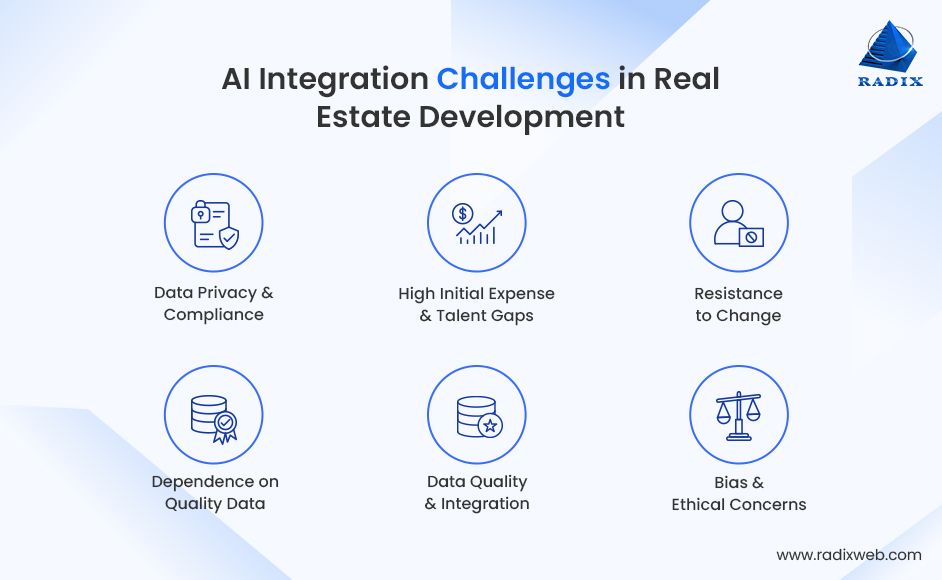
Data Privacy and Compliance
Real estate data contains confidential personal information. Hence, companies must abide by security standards such as CCPA and GDPR.
Best Strategy – We deployed strong data anonymization and encryption mechanisms to ensure our AI solutions abide by privacy-by-design standards.
High Initial Expense and Talent Gaps
When developing or adopting AI solutions, you’ll need to invest in cutting-edge technologies and skilled professionals.
Best Strategy - Our experts began with pilot projects to justify ROI; you can also invest in upskilling your employee capabilities and consider AI-as-a-service platforms.
Resistance to Change
Staff members and agents might get skeptical of integrating AI tools instead of replacing conventional processes.
Best Strategy – We involved users early in the deployment process and highlighted AI’s impact as a performance booster.
Dependence on Quality Data
The efficiency of artificial intelligence in real estate relies on the availability of accurate, real-time data.
Best Strategy - We prioritized continuous data acquisition and validation approaches. You can also join hands with trusted, reputable data providers.
Data Integrity During Integration
Data collected from different sources, such as financial records, CRM systems, and MLS listings, can be siloed and inconsistent.
Best Strategy - We integrated unified data repositories, focused on regularly cleaning and normalizing data, and used data integration platforms.
Bias and Ethical Concerns
AI models are trained on biased data that can sometimes generate discriminatory or unfair results.
Best Strategy - Despite working with advanced technologies, our experts ensure human control over AI results, perform frequent audits for bias, and use different training datasets.
By addressing these AI real estate challenges, businesses can maximize the value-driven impact obtained from the advanced technologies.
Real-Time AI Applications in Real Estate Industry
Enlisted below are the key use cases of AI in the real estate industry, along with their best features and examples:
1. Property Management
- Lease management optimization
- Maintenance request automation
- Automated tenant screening
For example, AppFolio implements AI to automate maintenance scheduling and tenant communications.
2. Customer Experience
- Virtual assistants managing property tours
- AI chatbots answering queries
For example, RealPage’s AI chatbot helps clients with instant, 24/7 support.
3. Lead Generation and Marketing
- Personalized email campaigns
- Data-driven lead assessment
For example, BoomTown uses AI models to recognize prospective buyers and tailor campaigns.
4. Investment and Portfolio Optimization
- Risk evaluation for property portfolios
- Market trend analysis
For example, Reonomy integrates AI to examine the commercial real estate market, which is expected to be valued at around USD 126.61 trillion by 2029 for better investment decisions.
5. Fraud Detection and Compliance
- Ensuring regulatory compliance
- Recognizing anomalous transactions
For example, Rentlytics integrates AI in its rental app to detect anomalies in financial records.
6. Property Search and Matching
- Smart filtering based on user behavior
- Matching buyer preferences with listings
For example, Zillow deploys AI to guide users on homes matching user criteria.
7. Virtual Staging and Visualization
- Optimizing property images
- Generating digital furniture layouts
For example, roOomy comes with an AI-powered virtual staging feature to exhibit vacant properties.
8. Predictive Maintenance
- Scheduling proactive repairs
- Sensor data analysis for elevators and HVAC
For example, BuildingIQ optimizes maintenance schedules and energy use with the help of AI.
How to Use AI in Real Estate?
Implementing AI for the real estate business is a journey, and to navigate it seamlessly, our experts follow clear, step-by-step phases, which are:
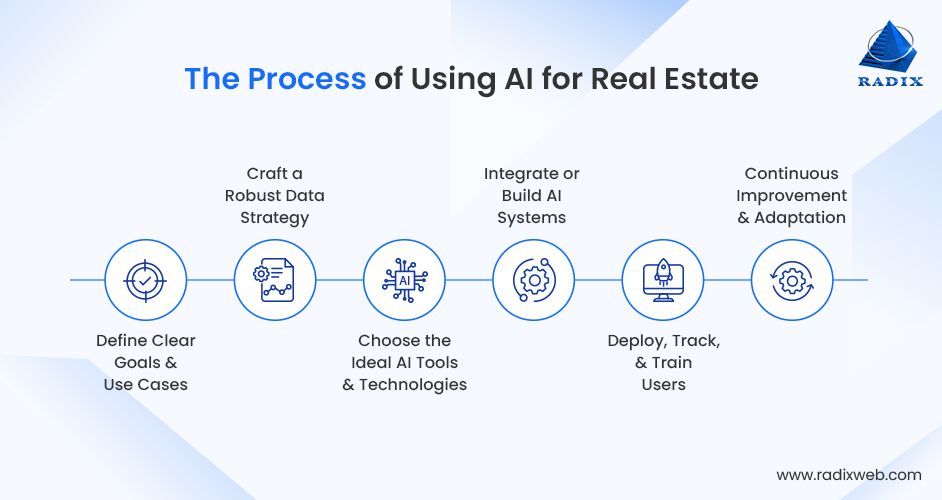
Phase 1: Define Clear Goals and Use Cases
Pick out specific business hurdles AI can handle, whether improving client engagement, automating property management, or helping with lead generation.
Phase 2: Craft a Robust Data Strategy
Analyze your data sources, storage, and quality. Also, plan strategically for continuous updates and data integration to power AI models efficiently.
Phase 3: Choose the Ideal AI Tools and Technologies
Evaluate AI frameworks and platforms aligned with your business and software goals. You can also consider AI-powered custom-developed software over off-the-shelf solutions.
Phase 4: Integrate or Build AI Systems
Incorporate third-party solutions into your existing processes or build AI solutions from scratch. This ensures top-tier interoperability.
Phase 5: Deploy, Track, and Train Users
In this phase, you launch advanced AI solutions or tools, monitor performance metrics, and accumulate user feedback. You can provide training to ensure seamless adoption of artificial intelligence in real estate.
Phase 6: Continuous Improvement and Adaptation
You can iterate based on the client feedback, expand AI applications in the real estate domain, and refine AI models. Also, stay up-to-date with the emerging AI tech trends.
The Future of AI in Real Estate
Looking to the future, AI is gaining immense traction and is becoming increasingly embedded and sophisticated across different real estate operations. From lead generation to property management, we've also built AI-driven solutions for every corner of real estate - and this is just the beginning. So, you can expect the future of AI in the real estate industry to look like:
- Hyper-Personalized Experiences - AI personalizing property suggestions based on client behavior and lifestyle.
- Blockchain and AI Integration – This partnership will help enhance security and transparency in property transactions.
- Sustainability Optimization - AI models will help with sustainability, optimizing energy efficiency and environmental impact of different properties.
- Autonomous Real Estate Agents - AI-powered assistants and chatbots capable of managing complicated negotiations and securing deals independently.
Choose Radixweb to Harness AI in Real Estate DevelopmentFrom a development partner’s perspective, AI is no longer an emerging tech trend; it's the core of state-of-the-art real estate software development. We’ve observed how innovative solutions can optimize data-driven investment strategies and hyper-personalize user journey, enhance asset valuation and lead scoring. Moreover, tools like generative AI and predictive analytics are also redefining digital engagement in proptech—turning legacy solutions into proactive, data-driven ecosystems.At Radixweb, we’ve not only keenly observed this transformation but also designed and delivered intelligent solutions that help address real-world challenges in real estate. Whether it’s integrating AI into outdated solutions, enabling smart innovation, or designing scalable PropTech platforms, our development teams help deliver AI-powered software solutions that are reliable, futuristic, and developed for performance at scale.If you’re ready to harness the power of AI in real estate, our experts are here to help you transform your business processes with intelligent, custom AI solutions.Contact us today to learn more.
Frequently Asked Questions
How can AI help real estate developers make smarter decisions?
What is the business value of AI in real estate operations?
What are some popular examples of AI in real estate?
What’s the ROI of investing in custom AI real estate solutions vs. off-the-shelf tools?
How can AI unlock revenue growth for real estate businesses?
Ready to brush up on something new? We've got more to read right this way.






